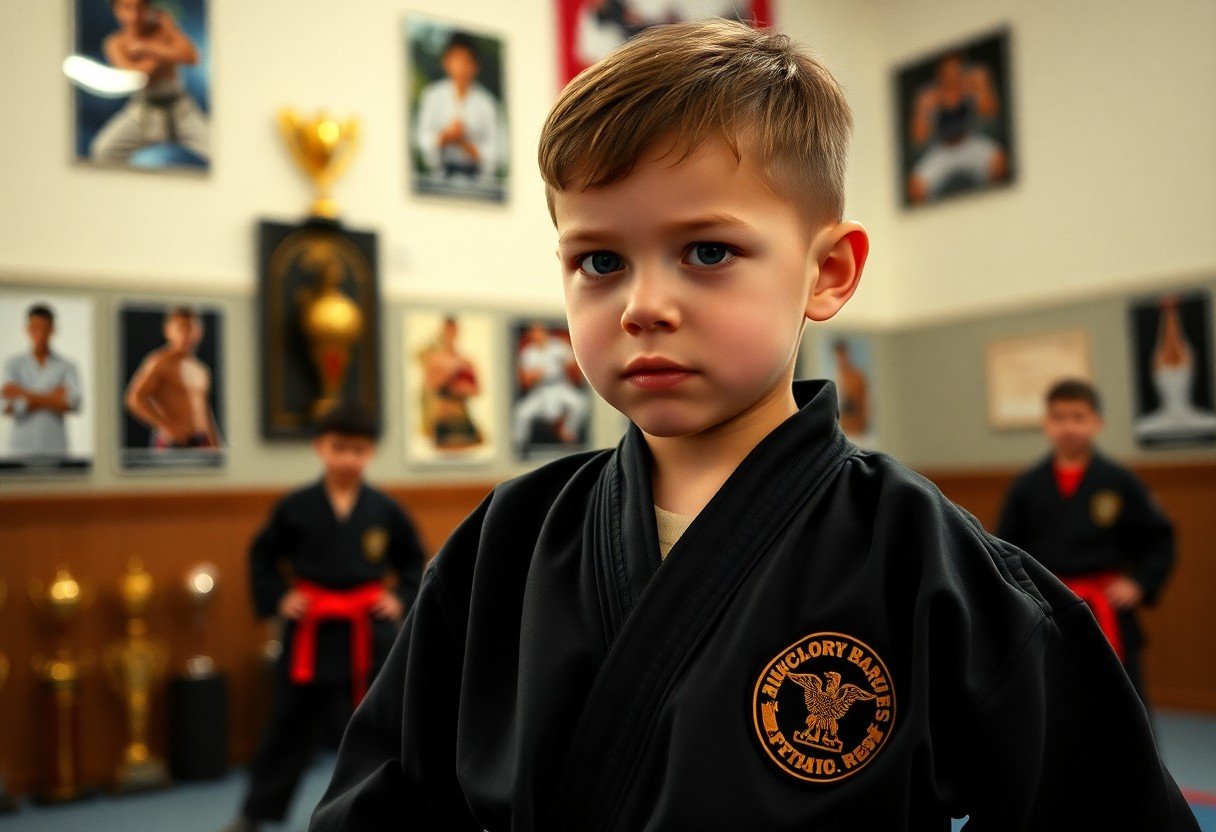Kids often thrive in environments that empower them individually while fostering discipline and respect. If you find that your child prefers personal focus and self-advancement over team dynamics, martial arts could be the ideal choice. Unlike traditional team sports, martial arts promotes self-defence skills, encourages mental resilience, and enhances physical fitness at their own pace. This can lead to improved self-esteem and a sense of accomplishment, making martial arts an enticing alternative for your child’s development.
Individual Development
Your journey in martial arts can significantly enhance your individual development. Unlike team sports that often depend on group dynamics, martial arts encourages personal growth through self-reflection and discipline. You have the opportunity to set your own goals and work at your own pace, enabling you to develop important life skills, such as resilience and determination, that are vital for success both on and off the mat.
Self-Discipline and Focus
About self-discipline and focus, martial arts training requires you to concentrate on your movements, techniques, and progress. This process fosters an internal sense of discipline as you must consistently practise and refine your skills. Over time, you will notice how maintaining focus during training can translate to improved concentration in other areas of your life, whether academically or personally.
Confidence Building
Before engaging in martial arts, many children may struggle with self-esteem and confidence. The structured training environment provides a safe space for you to challenge yourself, leading to gradual improvements in your abilities and a sense of achievement.
Due to the nature of martial arts, as you learn new techniques and overcome challenges, your confidence will grow substantially. Progressing through belts and martial arts ranks gives you a sense of accomplishment, reinforcing your belief in your own abilities. Each time you successfully execute a difficult move or spar effectively, you cultivate a growing sense of self-worth. This newfound confidence can positively impact various aspects of your life, preparing you to tackle challenges beyond the dojo with greater resilience.
Physical Fitness
You may find that martial arts offer a unique approach to physical fitness when compared to traditional team sports. The individual focus allows for customised training that strengthens both the body and mind. As discussed in Are martial arts or team sports with balls more beneficial to…, martial arts can help develop endurance, strength, and flexibility, providing a comprehensive workout for children.
Strength and Flexibility
For many kids, martial arts training significantly improves both strength and flexibility. This discipline involves a range of movements that engage various muscle groups, leading to better overall fitness levels. As children progress, they learn to harness their body’s power, enhancing their physical capabilities for everyday activities.
Coordination and Balance
Among the many benefits of martial arts, improvements in coordination and balance are particularly striking. The dynamic nature of martial arts requires practitioners to perform complex movements that challenge their body awareness and spatial orientation. As your child continues to practise, they will develop enhanced skills that translate into better performance in various physical activities.
Fitness is not just about strength; it also involves coordination and balance, which are pivotal for a child’s overall development. Engaging in martial arts helps improve these aspects through rigorous training routines and specific techniques. Your child will learn how to control their body movements more efficiently, reducing the risk of injuries in other sports and daily life. This enhanced balance and coordination can positively impact their confidence and physical performance on and off the mat.

Emotional Benefits
While many children thrive in team sports, Why Martial Arts Is Better For Kids Than Team Sports? demonstrates that martial arts can offer unique emotional benefits. Engaging in martial arts allows kids to better understand and manage their emotions, fostering a sense of self-awareness and control that is often missing in traditional team settings.
Stress Relief and Outlet for Emotions
An effective way for children to cope with stress is through the disciplined practice of martial arts. The combination of physical activity and mental focus helps your child to release pent-up energy and frustration, providing a healthy outlet for their emotions.
Resilience Through Challenge
The journey in martial arts encourages personal growth by presenting your child with various challenges to overcome. This process not only builds confidence but also cultivates problem-solving skills and emotional fortitude in the face of adversity.
In addition, through repeated practice and mastery of techniques, your child will learn the importance of persistence. Each belt they earn represents a milestone, highlighting their commitment and ability to face difficulties head-on. This inherently teaches you that challenges are not setbacks but opportunities for growth, fostering a mindset that is resilient and adaptable.
Social Interaction
After engaging in martial arts, you will find that social interaction is often more personal and meaningful than in conventional team sports. You work closely with your peers in a supportive environment, fostering bonds that are built on mutual respect and shared goals. The one-on-one interactions with instructors and fellow students can lead to a deeper understanding of each other’s strengths and weaknesses, which can promote a sense of belonging and community.
Building Respect and Camaraderie
Along your journey in martial arts, you will discover that respect and camaraderie are key components. These practices encourage you to honour your partners and forge strong relationships through shared experiences. The environment promotes encouragement and support, allowing you to celebrate victories together and learn from defeats, creating an enriching and interpersonal experience.
Learning from Diverse Peers
Learning from diverse peers in martial arts can significantly broaden your horizons. You encounter individuals from different backgrounds, each bringing their unique perspectives and techniques, which enrich your training experience. This diversity not only fosters understanding but also enhances your adaptability and skills.
To truly appreciate the benefits of learning from diverse peers, you should embrace the opportunity to train alongside people from various age groups, cultures, and experiences. Each person you meet offers a distinct viewpoint and helps you develop necessary social skills such as empathy and communication. As you blend these diverse influences into your martial arts practice, you cultivate an inclusive attitude that prepares you for real-world interactions beyond the dojo.
Life Skills Beyond Sports
For many children, martial arts offer a pathway to develop vital life skills that extend far beyond physical activity. Unlike team sports, which often focus on collaboration within a group, martial arts emphasise personal development, discipline, and individual responsibility. You will find that training fosters resilience, self-confidence, and respect for others, all vital attributes that can significantly benefit your child in various aspects of life.
Goal Setting
Below, you will discover how martial arts teach the importance of setting and achieving personal goals. By progressing through different belts and mastery levels, your child learns to establish clear objectives and work diligently to realise them, fostering a sense of accomplishment and motivation that can translate into academic and personal pursuits.
Conflict Resolution
On the surface, martial arts may appear to encourage fighting; however, they fundamentally teach conflict resolution skills. You will learn that these disciplines emphasise control, respect, and the ability to manage differences peacefully, equipping your child with skills necessary for handling disputes in everyday life.
Indeed, martial arts trainers encourage students to develop problem-solving skills by suggesting non-violent means to resolve conflicts. They teach you how to assess situations critically, allowing your child to remain calm and composed during disputes, thus promoting self-discipline and emotional intelligence. As a result, your child learns to navigate challenges confidently and constructively, enabling them to maintain healthy relationships and a positive self-image.
Choosing the Right Martial Art
Many parents find the process of selecting the right martial art for their child overwhelming. It is important to consider your child’s personality, interests, and physical capabilities. Each martial art offers unique benefits, so understanding the options available will help you make an informed decision. Engage your child in the selection process to ensure they are excited and invested in their training journey.
Types of Martial Arts
Around the world, various styles of martial arts cater to different interests and goals.
| Karate | Focuses on striking and self-defence techniques. |
| Taekwondo | Emphasises high kicks and agility. |
| Judo | Involves grappling and throws. |
| Brazilian Jiu-Jitsu | Focuses on ground fighting and submissions. |
| Muay Thai | Known as the art of eight limbs, favours strikes. |
Assume that the right martial art can greatly enhance your child’s physical and mental well-being.
Finding the Right Fit for Your Child
The journey to find the ideal martial art for your child involves understanding their unique needs and preferences. Assess their temperament, interests, and even their social skills before making a decision. Take them to observe classes and encourage them to try a few to see where they feel most comfortable. Choose a school that prioritises a positive atmosphere and qualified instructors.
To ensure your child thrives in their martial arts journey, you should continuously evaluate their engagement, progress, and enjoyment. Look for a dojo or academy that fosters a supportive environment and emphasises personal development. Pay attention to how the instructors handle discipline and focus, as this greatly influences your child’s experience. By remaining involved in their training and encouraging open communication, you can help your child navigate potential challenges and find their true passion in martial arts.
To wrap up
On the whole, choosing martial arts over team sports can offer you distinct advantages, especially if your child thrives in individual settings. The discipline, focus, and self-defence skills gained from martial arts can foster self-confidence and personal growth. Unlike team sports, martial arts allows your child to progress at their own pace, promoting a sense of achievement. Furthermore, the emphasis on respect and etiquette can instil valuable life lessons. Ultimately, if your child seeks a path of individual mastery and personal development, martial arts could be a more beneficial choice for them.
FAQ
Q: Why might some children benefit more from martial arts than from team sports?
A: Some children may find that martial arts suits their individual learning styles and personalities better than team sports. In martial arts, the focus is often on personal development, discipline, and self-control, which can foster self-confidence and resilience in children who might struggle with the competitive nature of team sports.
Q: How does martial arts support personal growth compared to team sports?
A: Martial arts places a strong emphasis on self-improvement and mastery of techniques, allowing children to set personal goals and track their progress. This individual focus often nurtures a strong sense of achievement and motivation. In contrast, team sports may prioritise collective goals, which can sometimes overshadow the personal achievements of individual players.
Q: Are there mental health benefits associated with martial arts that team sports might not provide?
A: Yes, martial arts can provide significant mental health benefits including improved focus, stress relief, and enhanced self-esteem. The meditative aspects of training can contribute to mindfulness and emotional regulation. While team sports can also provide support and a sense of belonging, the individual nature of martial arts often allows for deeper introspection and personal empowerment.
Q: How do martial arts teach discipline differently than team sports?
A: Martial arts typically require rigorous training and constant refinement of skills, which fosters discipline in a unique way. Practitioners are responsible for their own progress, learning to push through challenges independently. While team sports do emphasise discipline in terms of practice and teamwork, the focus can often be more on group dynamics rather than individual responsibility for one’s own development.
Q: Can martial arts aid in developing social skills in children?
A: Absolutely. While martial arts may seem solitary, they actually provide opportunities for children to interact with peers during classes, sparring sessions, and belt promotion tests. These interactions can help develop respect for others, effective communication skills, and the ability to work collaboratively in pairs or small groups. This social engagement can sometimes be more personalised and meaningful than the often larger group settings in team sports.



